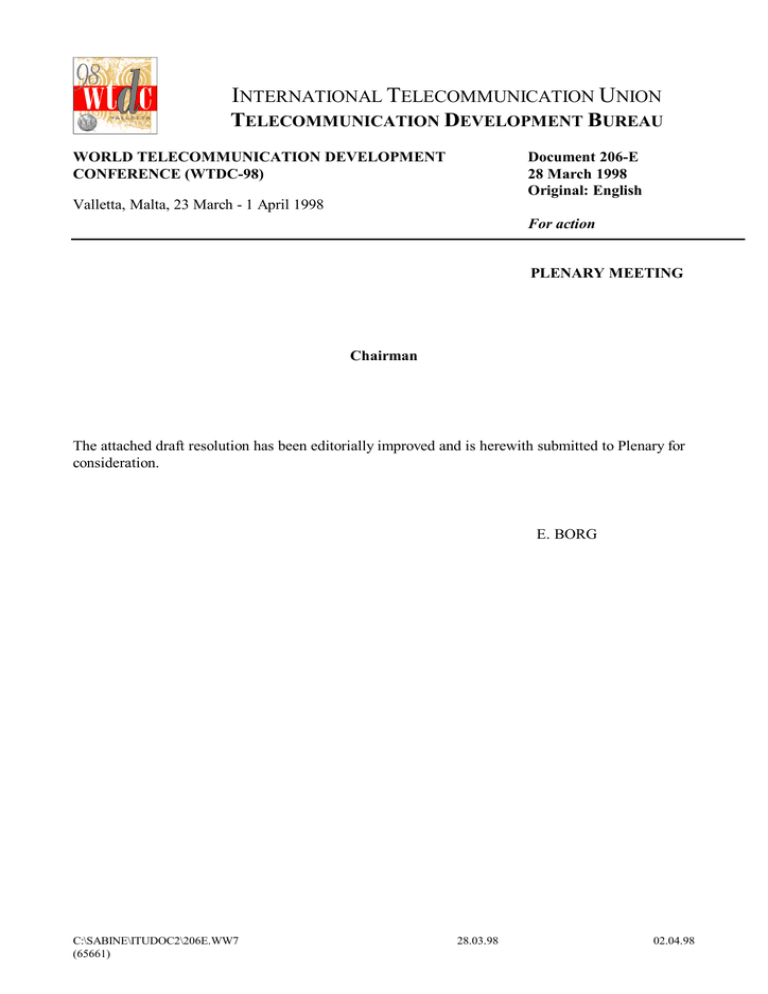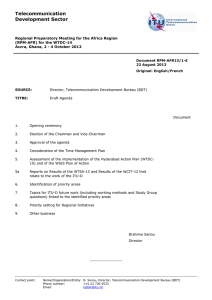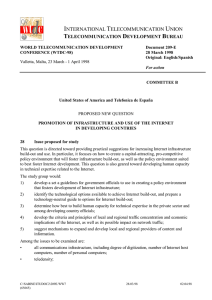I T U D
advertisement

I NTERNATIONAL TELECOMMUNICATION UNION TELECOMMUNICATION DEVELOPMENT BUREAU Document 206-E 28 March 1998 Original: English WORLD TELECOMMUNICATION DEVELOPMENT CONFERENCE (WTDC-98) Valletta, Malta, 23 March - 1 April 1998 For action PLENARY MEETING Chairman The attached draft resolution has been editorially improved and is herewith submitted to Plenary for consideration. E. BORG C:\SABINE\ITUDOC2\206E.WW7 (65661) 28.03.98 02.04.98 -2CMDT98/206-E DRAFT RESOLUTION TDAB-3 ESTABLISHMENT OF STUDY GROUPS The World Telecommunication Development Conference (Valletta, 1998), considering a) Article 21 and in particular No. 127 of the Constitution (Geneva, 1992) on the specific functions of the Telecommunication Development Sector (ITU-D); b) Nos. 209, 211 and 214 of the Convention (Geneva, 1992); c) the provisions of Resolution 7 of the Additional Plenipotentiary Conference (Geneva, 1992), having noted the documents presented to WTDC-98, having considered a) the Report by the Director of the Telecommunication Development Bureau (BDT) on the activities of the Bureau since WTDC-94; b) the Questions which it has been decided that ITU-D should study during the 1998-2002 study period in close coordination with the implementation of the planned activities of ITU-D; c) Resolutions 1 and 24 of the Plenipotentiary Conference (Kyoto, 1994), taking into account the economic and social environment prevailing in the different regions, recognizing a) the desirability of studying at the global level a number of priority problems related to the institutional, technical, commercial, regulatory and economic evolution of the telecommunication sector, having regard to the progressive globalization of the sector and its implications for the developing countries; b) the need for the Director of the BDT to take appropriate steps to facilitate the active participation of both developing and developed countries in the work of the Telecommunication Development Sector, stressing the need to avoid duplication between studies undertaken by the Telecommunication Development Sector and those carried out by the Radiocommunication and Telecommunication Standardization Sectors, resolves to create within the Telecommunication Development Sector two study groups. C:\SABINE\ITUDOC2\206E.WW7 (65661) 28.03.98 02.04.98 -3CMDT98/206-E The following descriptions of areas of natural expertise and interest may be helpful in categorizing and grouping Questions and issues: • national telecommunication policies and regulatory strategies which best enable countries to benefit from the impetus of telecommunications as an engine of economic, social and cultural development; • finance and economics, including WTO issues, tariff policies, case studies, application of accounting principles as developed by ITU-T Study Group 3, private sector development and partnership - details to be determined; • methods, techniques and approaches that are the most suitable and successful for the service providers in planning, developing, implementing, operating, maintaining and sustaining telecommunication services which optimize their value to the users. This work will include specific emphasis on communications for rural and remote areas, and particular focus and emphasis on applications enabled by telecommunications, including, inter alia, telemedicine, distance education, electronic transactions, database access, and other opportunities as appropriate; • Human Resources Management/Human Resources Development, including all aspects of training and development, with particular emphasis on electronic techniques, and also related supporting functions, including, inter alia, handbooks; • the implementation and application of information technology, Internet and convergence, using technologies studies by the other Sectors, taking into account the special requirements of the developing countries. Appendix: 1 C:\SABINE\ITUDOC2\206E.WW7 (65661) 28.03.98 02.04.98 -4CMDT98/206-E APPENDIX TO DRAFT RESOLUTION TDAB-3 TERMS OF REFERENCE OF ITU-D STUDY GROUPS ITU-D study groups shall: 1) Organize the work, and establish work programmes, so as to make optimum progress while respecting the limits of the resources available. The schedule of the work programmes should duly consider the required timing of the expected output. 2) Establish appropriate groups within each study group, including, inter alia, rapporteur groups and focus groups, which will best facilitate the furthering of the work. This will include the establishment of regional groups when appropriate. 3) Prepare recommendations, opinions, guidelines, handbooks, manuals and reports within each study group's areas of competence. 4) Pay particular attention to the needs and concerns of the Least Developed Countries, in furthering the work. 5) Ensure appropriate coordination with work in progress within the Secretariat of ITU-D, including the regional and area offices. 6) Ensure appropriate coordination with work in progress in the other two Sectors of the ITU, including work both within the study groups and within the Sector Secretariats. _________________ C:\SABINE\ITUDOC2\206E.WW7 (65661) 28.03.98 02.04.98

